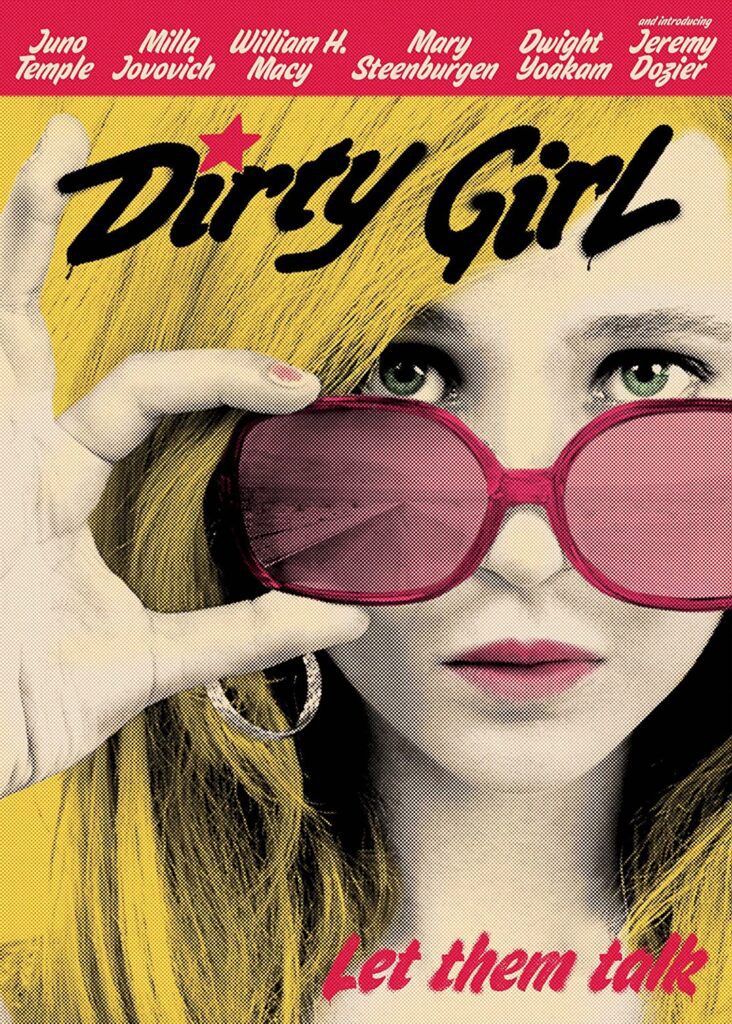
Written by Ben Platko
I waited for what seemed like eons for my copy of Dirty Girl to arrive in the mail. When the Fed-Ex envelope finally came to my door, I was elated. After weeks of watching nothing but deep symbolic films, I could finally let my brain take a vacation. I would be lying if I said I wasn’t a little disappointed.
Dirty Girl is not a good movie. However, between bouts of ham-fisted messages about being yourself and mediocre dick jokes, there is a spark of a story. On the back cover you’ll find the entire plot laid out for you. In a nutshell, Danielle (Juno Temple) is the school scratching post in 1987 Oklahoma. She runs off with Clarke (Jeremy Dozier) to Fresno to find her birth father while her mother (Milla Jovovich) is away for the weekend with her Mormon fiancee (William H. Macy). Clarke’s parents (Mary Steenburgen and Dwight Yoakam) are also trying to find them. The director (Abe Sylvia) developed the story in film school, and it shows. The story is just that: a story. It’s not that bad, but it reeks of indie-flick influence in the worst possible way: it was too conservative. After Diablo Cody won the Oscar for best original screenplay, everyone and their brother wanted to make another Juno. What made Juno an Oscar winner and immediate classic was its distinct visual style and witty writing. Dirty Girl missed on both counts by holding back too much.
Sylvia also makes the mistake of giving William H. Macy very little screen time: we never get to see his character develop. Sylvia has pigeonholed Mormons (which is an admittedly easy thing to do, but it would have been nice if he tried not to). Milla Jovovich had just a few more minutes on the screen, and delivered the most believable performance in the film. She plays a devil-may-care single mom trying to balance her rebellious daughter and strict fiancee. In the end, she comes across as a real person, which is the only redeeming quality of Dirty Girl.
There’s an odd, mix-matched soundtrack under everything, and honestly I could really get on board with it. I would like to say that the music makes up for the lack of story, but it doesn’t. Despite having some solid tracks (including a gnarly cover of “Delta Dawn” mixed in with Joan Jett, Sheena Easton, and Melissa Manchester), Le Tigre’s “Deceptacon” makes one too many appearances. The first time we hear it, it fits. However, because it is so unique and stylistically distinct from the rest of the soundtrack, the second time it plays it is immediately recognizable, and comes across as lazy editing.
The bonus features you’ll find on your copy of Dirty Girl (the one you get from Netflix, because you won’t buy it) are pretty standard. A few deleted and extended scenes, and a director’s commentary. Much like the film, the special features are nothing impressive. If you see the box in the bargain bin, you’ll notice the film’s praise on the back cover. Hellin Kay from The Huffington Post says it’s “a pitch-perfect comedy” and Ariana Anderson of Bust Magazine claims that it “will melt even the coldest of hearts.” Remember that the next time you read their reviews.
To Sylvia’s credit, most of the period details are fairly solid which is a tricky thing to accomplish. On that note, I’ll leave you with this final thought. I went to the premiere of a movie titled Street Boss which was about the mafia in the mid ’70s. The protagonist drove a smart car, which looks too futuristic right now. You heard it here first: Dirty Girl is better than Street Boss.